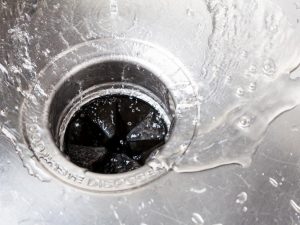Garbage Disposal Trouble Shooting
Garbage disposals are perhaps one of the most frequently used and most frequently underappreciated of our kitchen appliances! If you’ve ever had a sink without a garbage disposal, you’ll quickly realize how handy the little appliance really is! Even if you take great care of your garbage disposal, leaks can and will develop over time. Garbage disposals, although small, have several parts and it can take some trouble shooting to identify where the leak is coming from. If you tend to be a DIY’er, you may want to investigate the leak before calling a professional plumber.

We mentioned that garbage disposals have several parts. With most garbage disposal leaks, there are four main areas where they may occur-
- The sink flange- The sink flange connects the top of the disposal to the bottom of the sink drain.
- The dishwasher connection- This is usually a rubber hose connected to the side of the garbage disposal.
- The drain pipe- This is usually a plastic or metal pipe that drains water and food away to the sewer.
- The actual garbage disposal
If you want to try and identify the source of the leak yourself, you can do an easy test. Make sure to dry the outside of the disposal and all of its parts that you can see so that the leak will be easily visible to you. Next, stop up your sink and fill it with a few inches of water. After a few minutes, if you notice water coming from the disposal under the sink, you’re leak is probably coming from the sink flange. If, after a few minutes, the disposal under the sink is still dry, pull the sink stopper and watch the other three parts we mentioned above. You should notice water coming from the dishwasher hose, the drain pipe, or some other area of the disposal.
Once you’ve identified the leak, you can decide whether or not to try and fix it yourself. Of course, the repair necessary will depend on where you determined the leak was located. Sometimes, fixes are easy and sometimes fixes that seem easy and simple will turn into large, complicated solutions. If the leak is coming from the sink flange, it may just need tightening. If simply tightening it doesn’t work, you may need to loosen it, apply plumbers putty to reseal it, and then tighten it back up. If the dishwasher hose is the culprit, you may need to either tighten it or replace it depending on whether its just loose or if its cracked. The drain pipe may also be able to be tightened. If tightening it doesn’t fix the leaky drain pipe, you may need to replace the seal. Sometimes, the entire disposal needs to be replaced.
For help with garbage disposal trouble shooting, repairs, or replacement, call the professionals at Masterflo Plumbing today at (678) 822-7095!
